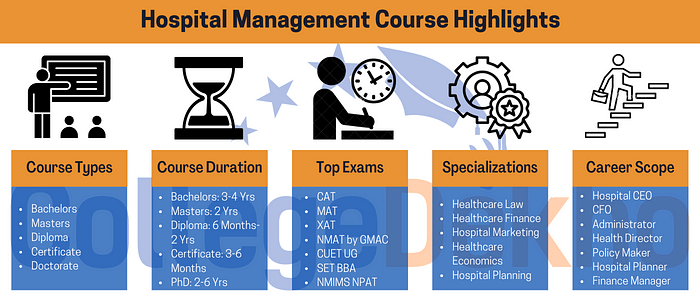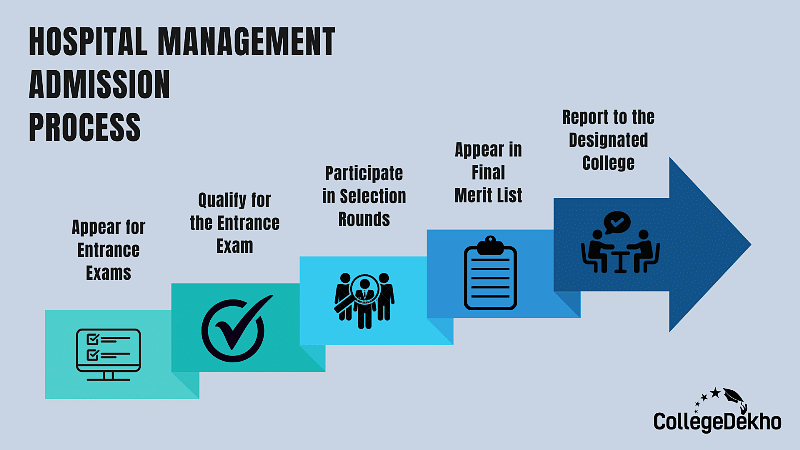Hospital Management Courses
Hospital Management courses are specialized academic programs designed to equip students with the knowledge and skills essential for managing and administrating hospitals and other healthcare facilities. By pursuing such courses, students learn to navigate the complexities of healthcare delivery, ensuring operational efficiency, enhancing patient care, and improving the overall performance of healthcare institutions. Graduates often find opportunities in hospital administration, healthcare consulting, health insurance management, and policy-making in both the public and private sectors.
What is Hospital Management Course?
Hospital Management course prepares students to efficiently manage hospital departments, resources, and staff to achieve specific healthcare outcomes. The course is available at various levels of study such as undergraduate, postgraduate, diploma, PhD, etc. BBA in Hospital Management, MBA in Hospital Management, and Diploma in Hospital Management are some of the popular courses offered by many top colleges. During these courses, students study Hospital Management subjects like Hospital Personnel Management, Legal Aspects in Hospitals, Hospital Operations Management, Basic Concepts of Epidemiology, Inventory and Stores Administration, Occupational Health, etc.
Admission into a Hospital Management course is primarily based on candidates' academic background and scores on entrance exams like CAT, XAT, NMAT, CUET, etc. However, many colleges offer direct admissions as well. Among the major colleges in India that provide Hospital Management courses are Symbiosis Institute of Health Sciences, TISS, Apollo Institute of Hospital Administration, and International Institute of Health Management Research. After graduation, students can find various Hospital Management jobs including Hospital Administrator, Health Director, Policy Maker, Finance Manager, Project Manager, Quality Assurance Manager, etc. The average annual Hospital Management salary ranges from INR 3.5 LPA to INR 6 LPA. Get more details about Hospital Management courses below.
Hospital Management Latest Updates
- KMAT Kerala 2024 Session 1 exam is to be conducted on March 3, 2024. Students appearing for the exam can download the KMAT Kerala admit card 2024 available on the official website (cee.kerala.gov.in).
- MAH MBA CET 2024 admit card will most likely be released in the last week of February 2024. The exam will be conducted on March 9 & 10 in online mode by the Common Entrance Test Cell Maharashtra.
- CMAT 2024 registration will begin soon, most likely in the last week of February 2024. NTA will announce the exam date along with the release of the application form on the official website at cmat.nta.nic.in.
- CUET UG 2024 exam is to be conducted from May 15 to 31, 2024. Candidates preparing for the exam can download the complete CUET syllabus 2024 PDF released by the National Testing Agency (NTA).
Table of Contents
- What is Hospital Management Course?
- Hospital Management Latest Updates
- Hospital Management Highlights
- Why Choose a Hospital Management Course?
- What is an Online Hospital Management Degree?
- What is the Difference Between Hospital Management and Healthcare Management?
- Types of Hospital Management Courses
- Hospital Management Eligibility Criteria
- Hospital Management Entrance Exams in India
- List of Popular Hospital Management Specializations
- Hospital Management Admission Process in India
- Direct Hospital Management Admission Process Without Entrance Exam
- Hospital Management Course Fees
- Hospital Management Syllabus
- Top Private Hospital Management Colleges in India
- Top Government Hospital Management Colleges in India
- Top Colleges for Hospital Management by Location
- Career Options After Hospital Management
- FAQs about Hospital Management
Hospital Management Highlights
Following are the important highlights related to the Hospital Management course.
| Particulars | Details |
|---|---|
| Name of the Course | Hospital Management |
| Types of Hospital Management Courses | Undergraduate, Postgraduate, Diploma, Doctoral |
| Mode of Learning | Regular, Distance Learning, Part-Time Course |
| Duration |
|
| Exam Type | Semester-based |
| Eligibility Criteria | Bachelor's degree with a minimum 50% aggregate score |
| Selection Process | Entrance + Merit-based |
| Popular Entrance Exams | CAT, MAT, XAT, NMAT by GMAC, CMAT, CUET |
| Top Colleges in India | Symbiosis Institute of Health Sciences, Tata Institute of Social Sciences, School of Management Studies, Hyderabad University, Apollo Institute of Hospital Administration, International Institute of Health Management Research |
| Hospital Management Course Fees | INR 20,000 - INR 6,00,000 |
| Hospital Management Job Prospectus | Hospital CEO, Hospital CFO, Administrator, Health Director, Healthcare Finance Manager, Chief Nursing Officer, Clinical Project Manager, Medical Affairs Manager |
| Average Starting Salary | INR 3.5 lakhs to INR 6 lakhs per annum |
| Top Recruiters | Fortis Healthcare Limited, Apollo Hospitals, Infosys, AIIMS, KPMG, AMGEN, Omega Healthcare Management, Health Trail Portal, Star Health, Pfizer, Cipla, Glenmark |

Why Choose a Hospital Management Course?
Healthcare and Hospital Management courses have been in the spotlight in recent years, both in our country and abroad. This position is ideal for applicants who have an extensive understanding of the medical field as well as great communication abilities. Becoming a graduate, earning a diploma, or completing an MBA (postgraduate) in this profession can allow you to enter lucrative career chances. Below are some of the reasons why someone must study a Hospital Management course.
Growing Field with Stability and Limitless Potential
The field of Hospital Management extends beyond the patient care fields of a physician, nurse, and therapist. In terms of employment stability, both the private and public health industries hire specialists on a long-term basis. This immediately increases your chances of landing a solid position while also building knowledge. Furthermore, various tasks of a healthcare manager, such as staffing, planning, accounting, marketing, human resources, public relations, and so on, are highly dynamic.
A One-of-a-Kind Bachelor's and Master's Degree
This is a less popular professional path among students. Being a hospital manager with a recognized degree or diploma in Hospital Management is a rare job. Most students and medical professionals in India are unaware of the graduate course, MBA in Hospital Management, or PG diploma.
Higher Lifetime Earnings and Opportunities
Many roles within Hospital Management's specialized divisions or departments—from administrative services managers to human resource managers—pay more than any other Management sector. As a result, one should expect salary increases as well as progression in opportunities.
International Lookouts and Dynamic Scale
Management is the most sought-after career. There is greater job flow on both the national and global levels, especially for those in hospital administration or the healthcare industry. Expert professionals can find work opportunities on multinational projects. The necessity for excellent healthcare leadership with acute business acumen and strategic managerial skills continues to rise with an individual's experience to work in any scenario.
Advanced Communication
On-the-job training, interacting with a large number of patients regularly, and handling the records of staff, doctors, and other hospital resources leads to great field expertise. And, indirectly, it encourages stronger communication skills, as well as patience, self-confidence, and dealing with stressful situations. Making the transition to healthcare Management and Hospital Management can be a strange option. Looking at the bright side, you could consider pursuing a job in this industry.

What is an Online Hospital Management Degree?
Nowadays, individuals interested in pursuing a career in Hospital Management have the option to enrol in online courses. Several reputable online platforms offer admission to Hospital Management courses, providing candidates with a more flexible and convenient way of learning. This is especially beneficial for individuals who have a busy schedule or work full-time, as they can manage their own time and pace of study. With the help of Hospital Management online courses, candidates can acquire the knowledge and skills needed to excel in their respective disciplines and gain a degree in Hospital Management from the comfort of their own home.
Popular Online Hospital Management Courses in India
Given below are some of the best Hospital Management online courses:
| Name of the Course | Offered By | Duration | Type | Fees |
|---|---|---|---|---|
| MBA in Hospital and Healthcare Management | School of Management, MIT WPU, Kothrud, Pune | 2 Years | Full-Time | INR 8,00,000 |
| Post Graduate Diploma in Hospital and Health Management (PGDHM) | International Institute of Health Management Research (IIHMR), Delhi | 2 Years | Full-Time | INR 7,50,000 |
| PGDM in Healthcare | Welingkar Mumbai, Matunga West | 2 Years | Full-Time | INR 12,00,000 |
| MBA in Hospital and Health Management | IIHMR University, Jaipur | 2 Years | Full-Time | INR 10,00,000 |
| MBA in Hospital and Health Care Management | SIU Pune, Senapati Bapat Road Campus | 2 Years | Full-Time | INR 8,00,000 |
| MBA in Healthcare and Hospital Management | ICRI Bangalore - Institute of Clinical Research India Bangalore | 2 Years | Full-Time | INR 11,00,000 |
| Executive MBA in Healthcare Administration | FMS Delhi | 2 Years | Part Time-Classroom | INR 2,00,000 |
| Bachelor of Hotel Management (BHM) | Welcomgroup Graduate School of Hotel Administration, Manipal | 4 Years | Full-Time | INR 15,00,000 |
| Master in Hospital Management (M.H.M) | Department of Hospital Management, Nampally, Hyderabad | 2 Years | Full-Time | INR 5,00,000 |
What is the Difference Between Hospital Management and Healthcare Management?
Aspirants who wish to pursue management with a specialization related to the medical industry have quite a few options. Hospital Management and Healthcare Management are both popular courses in the field and it is common for aspirants to get confused between the two courses. Both these courses have quite a few similarities including the most obvious one which is they both cater to the management of healthcare and medical organizations. That being said, it is important that candidates understand the differences between hospital management courses and healthcare management courses so that they can make an informed decision based on their personal needs and which of the two courses meets their requirements. Check the table below to know the primary differences between Hospital Management and Healthcare Management.
| Healthcare Management | Hospital Management |
|---|---|
| Healthcare management involves managing the financial infrastructure of a healthcare or medical organization as well as its commercial activities and operational aspects. | In order to ensure the effective functioning of a hospital, hospital administration comprises supervising and facilitating the work associated with doctors, nurses, and other healthcare professionals. |
| Hospitals serve as safety nets for their communities. | It is engaged more directly in hospital policies and practices. |
| Since the manager's primary responsibility is to support the organization rather than deal with emergency situations (which are unlikely to develop in this situation), the manager often doesn't need to devote as much attention to the organization's daily operations. | The manager has direct input into how the hospital's policies and practices are established. |
| The manager works away from the frontlines in the healthcare industry. | The manager performs their duties on-site and is required to handle urgent issues as they come up continuously. |
Types of Hospital Management Courses
Hospital Management courses are available at many levels of study, including diploma, undergraduate, postgraduate, and doctoral. There are also a variety of short-term certification courses available that are relevant to hospital or healthcare Management in some way. These Hospital Management courses cover healthcare services provided in hospitals, nursing homes, diagnostic centres, clinics, and healthcare institutes, among other places. It also equips students with in-depth information to carry out managerial and administrative functions in hospitals or other medical facilities. Given below are the various types of Hospital Management courses that are available for aspirants in India.
Undergraduate Hospital Management Course
An undergraduate Hospital Management course is designed to equip students with an in-depth understanding of the healthcare industry, specifically focusing on healthcare administration and management principles within the context of hospitals and other healthcare facilities. The objective of the course is to provide students with a comprehensive understanding of the healthcare industry, enabling them to succeed in various healthcare management roles and make a positive impact on the healthcare system.
- Duration: 3 Years
- Popular Degrees: Bachelor of Hospital Management, BBA in Hospital Management, BBA in Healthcare Management
Postgraduate Hospital Management Course
Postgraduate Hospital Management courses are advanced academic programs intended for individuals who have already completed their undergraduate studies and have a background in healthcare or management. These courses provide specialized education and training to enhance their knowledge and skills in the field of hospital administration. Through a postgraduate Hospital Management course, students gain a deeper understanding of the complex challenges faced by modern healthcare systems and learn how to effectively manage hospital operations while ensuring high-quality patient care.
- Duration: 2 Years
- Popular Degrees: Master of Public Health, Master of Hospital Management, MBA in Healthcare and Hospital Management, MBA in Hospital Management, MMS in Healthcare Management, MSc in Hospital Management
Diploma Hospital Management Course
Individuals who aspire to pursue a career in Hospital Management or seek to advance their existing roles can opt for a diploma in Hospital Management course. The program is designed to offer a more concentrated and concise curriculum compared to traditional undergraduate or postgraduate degrees. Diploma in Hospital Management course is an ideal choice for those who may not have the flexibility or resources to commit to a more extended degree program but still want to acquire the necessary skills and knowledge to succeed in the healthcare industry.
- Duration: 2 Years
- Popular Degrees: Diploma in Hospital Management, Advance Diploma in Healthcare Informatics and Management, Post Graduate Diploma in Hospital Management, Diploma in Medical Sterilization And Hospital Logistics
Certificate Hospital Management Courses
Certificate courses in Hospital Management are designed to provide individuals with specialised training and expertise in key areas of healthcare administration. These programs are an ideal choice for those looking to enhance their skills and knowledge in a specific area of Hospital Management without committing to a longer-term program. They are generally shorter in duration compared to diploma or degree programs and offer a focused curriculum that prepares students for a wide range of careers in healthcare management.
- Duration: 2 Years
- Popular Degrees: Certificate in Healthcare Administration, Certificate in Health Care Waste Management, Executive Programme in Healthcare Management, Certificate in Healthcare Counseling
Doctoral Hospital Management Course
A doctoral program in Hospital Management is an advanced academic program that offers the highest level of qualification in the field. The program is designed to prepare students for advanced research and scholarship in hospital management, healthcare administration, and related areas. Doctoral programs in Hospital Management typically require several years of study and research, culminating in a dissertation or thesis that demonstrates the student's ability to conduct original research in the field. Graduates of these programs are highly sought after in the healthcare industry and can pursue careers as hospital administrators, healthcare executives, consultants, and researchers.
- Duration: 2 Years
- Popular Degrees: Ph.D. in Hospital Management, DBA in Healthcare Management
Hospital Management Eligibility Criteria
The Hospital Management course eligibility criteria are quite different from other management courses. Since Hospital Management deals with medicine and healthcare, candidates must have a background in the same field. Check out the Hospital Management course eligibility criteria for undergraduate, postgraduate, diploma, and PhD courses in the table below:
| Type of Course | Eligibility Criteria |
|---|---|
| Undergraduate Course |
|
| Postgraduate Course |
|
| Diploma Course |
|
| Ph.D. Course |
|
Skills Required for Hospital Management Courses
Candidates who wish to have a career in Hospital Management are required to have certain kinds of skills which will help them to work in a dynamic healthcare environment. Below are some of the important skills that are required to be there in a candidate who wish do a Hospital Management course and then work in a Healthcare system:
| Accountability | Impact and Influence | Leadership Skills |
|---|---|---|
| Achievement Orientation | Innovative Thinking | Talent Development |
| Strategic Orientation | Financial Skills | Change Leadership |
| Self Confidence | Organizational Awareness | Communication Skills |
| Professionalism | Collaboration | - |
Hospital Management Entrance Exams in India
In order to get admission in some of the best courses in Hospital Management such as MBA, candidates are required to clear the entrance exams. Some of the popular and important exams which are required to get admission to Hospital Management are listed below.
Hospital Management Entrance Exams for UG Courses
| Name of the Exam | Conducting Body | Application Dates | Exam Date |
|---|---|---|---|
| CUET UG 2024 | National Testing Agency (NTA) | February to March 2024 | May 15 to 31, 2024 |
| SET BBA 2024 | Symbiosis International (Deemed University) | December 13, 2023 to April 12, 2024 | Test 1: May 5, 2024 Test 2: May 11, 2024 |
| AIMA UGAT 2024 | All India Management Association (AIMA) | February to March 2024 | May 2024 |
| NMIMS NPAT 2024 | Narsee Monjee Institute of Management Studies | December 6, 2023 to May 20, 2024 | January 1 to May 25, 2024 |
Hospital Management Entrance Exams for PG Courses
| Entrance Exam | Conducting Body | Application Dates | Exam dates |
|---|---|---|---|
| CAT 2024 | Indian Institute Of Management | August to September 2024 | November 24, 2024 (Expected) |
| CMAT 2024 | National Testing Agency (NTA) | February 2024 | April/ May 2024 |
| XAT 2024 | XLRI Jamshedpur | July 15 to December 10, 2023 | January 7, 2024 |
| SNAP 2023 | Symbiosis International (Deemed University) | August 23 to November 23, 2023 |
|
| NMAT by GMAC 2023 | Graduate Management Aptitude Council (GMAC) | August 1 to October 12, 2023 | October 10 to December 19, 2023 |
| MAT 2024 (February Session) | All India Management Association (AIMA) |
|
|
List of Popular Hospital Management Specializations
In today's world, the healthcare industry is rapidly evolving, and the demand for skilled healthcare administrators is on the rise. To cater to this demand, many universities and colleges in India offer specialized degree programs in hospital management that equip students with the necessary knowledge and skills to manage healthcare organizations efficiently. Take a look at the different Hospital Management specializations available in India.
Healthcare Management
Healthcare management comprises health insurance, managed care, and healthcare policy. In addition to these, it also includes courses that have a business focus such as marketing, principles of management, and human resources management. The courses are designed to cover a broad range of topics including quality assurance, decision-making in managed care, mergers and acquisitions, and organizational communication.
Healthcare Informatics
Healthcare informatics involves specialized courses in healthcare information systems, data analysis, ethics in information management, electronic patient records, and security and privacy. Graduates can find employment in various settings including insurance, residential care, public health, research, hospitals, medical care offices, and long-term care facilities.
Healthcare Law and Policy
Qualified administrators are required to stay up-to-date with the ever-changing regulations and legislation related to healthcare in order to implement necessary changes within different healthcare settings. The healthcare law and policy specialization involves studying health systems, ethical considerations in health care, applied healthcare law, as well as health policy. Students will also learn about public health, public healthcare regulation, policy analysis in health care, and health service delivery theory.
Hospital Financial Management
Hospital Financial Management courses are designed to provide a comprehensive understanding of the financial aspects of the healthcare industry. To excel in this field, it is essential to acquire knowledge in various aspects such as budgeting, health services finances, accounting, venture development, and economics. Additionally, obtaining professional certifications can further enhance one's expertise and credibility in this field.
Hospital Administration
Hospital administrators need a diverse set of knowledge in healthcare and business functions to create policies that help in the delivery of care across various healthcare environments. An education in healthcare administration is essential to lead, make decisions, and handle administration tasks in hospitals, managed care facilities, insurance companies, and public policy organizations.
Hospital Management Admission Process in India
The admission requirements for Hospital Management courses differ depending on the type of course you're interested in pursuing, such as undergraduate or postgraduate. However, the admission process for most colleges is often similar and follows a few important steps given below.
- Appear for the Entrance Exam: You first need to appear for an entrance exam accepted by the college you wish to attend. This exam is designed to test your aptitude and knowledge.
- Qualify for the Entrance Exam: After that, you need to qualify for the exam and meet the required cutoff as prescribed by the college. The cutoff score varies from college to college.
- Participate in Selection Rounds: The college will further shortlist the candidates based on their exam performance. Shortlisted candidates may be required to participate in selection rounds such as a personal interview, group discussion, or written ability test.
- Appear in Final Merit List: If you perform well in the selection rounds, you will be considered for final admission. You will be notified of the admission process once you are allotted a seat in your desired college.
- Report to the Designated College: You will need to report to the college and complete all the necessary formalities such as document verification, fee payment, and hostel accommodation (if required).

Direct Hospital Management Admission Process Without Entrance Exam
In India, there are numerous colleges that offer courses in Hospital Management. Many of these colleges provide direct admission to students, based on their academic background. However, before applying, it is important to check the eligibility criteria specified by the college for the particular course you are interested in. Once you meet the requirements, you can fill out the application form and submit it to the college. In case your application is selected, you may be called for a personal interview. This is done to assess your suitability for the course and to ensure that you have the necessary skills and knowledge required for Hospital Management.
Direct admission can be an excellent option for students who do not wish to go through the entrance exam and counselling process. However, it's important to note that different colleges may have different admission procedures and regulations. Therefore, it is always advisable to do thorough research before selecting a college for a Hospital Management course.
Hospital Management Course Fees
The fees for Hospital Management courses may differ from college to college. The table below provides an overview of the fees for Hospital Management courses, but candidates should note that the actual fees may differ from those listed. To get a better idea of the fees for a particular course, candidates are advised to visit the official website of the college or to consult with them by phone or in person.
| Level of the Course | Private College | Government College |
|---|---|---|
| Undergraduate Hospital Management Course Fees | INR 45,000 to INR 5,60,000 | INR 30,000 to INR 4,00,000 |
| Postgraduate Hospital Management Course Fees | INR 15,000 to INR 7,00,000 | INR 4,250 to INR 3,00,000 |
| Doctoral Hospital Management Course Fees | INR 2,00,000 to INR 5,00,000 | INR 10,000 to INR 2,00,000 |
| Diploma Hospital Management Course Fees | INR 20,000 to INR 1,00,000 | INR 15,000 to INR 2,00,000 |
Hospital Management Syllabus
Check out the Hospital Management syllabus for different types of courses mentioned in the table below.
| Type of Course | Syllabus |
|---|---|
| Bachelor in Hospital Administration |
|
| BBA Hospital Management |
|
| MBA in Healthcare and Hospital Management |
|
| Advanced Diploma in Healthcare Informatics and Management |
|
| Master of Public Health |
|
Top Private Hospital Management Colleges in India
Check out some of the top private Hospital Management colleges along with their fees and NIRF Ranking 2023 listed below.
| Name of the College | Approx. Fees | NIRF Ranking 2023 |
|---|---|---|
| Manipal University (MAHE) - Manipal Academy of Higher Education | INR 7 Lakhs | 16 |
| BITS Pilani - Birla Institute of Technology and Science | INR 5 Lakhs | 25 |
| JSS Academy of Higher Education and Research | INR 3.46 Lakhs | 55 |
| Jamia Hamdard, New Delhi | INR 4.70 Lakhs | 78 |
| Sri Ramachandra Institute of Higher Education and Research, Chennai | INR 4 Lakhs | 98 |
| GITAM Institute of Management, Visakhapatnam | INR 3.60 Lakhs | - |
| GEMS Tirupati - GEMS B School | INR 4.40 Lakhs | - |
| NSHM Kolkata - NSHM Knowledge Campus | INR 5.40 Lakhs | - |
| DYPUSM Mumbai - School of Management Dr DY Patil University | INR 8.40 Lakhs | - |
| SRM Institute of Science and Technology, Ramapuram Campus | INR 5 Lakhs | - |
| ITM School of Management, Gwalior | INR 9 Lakhs | - |
| Amity University, Gurgaon | INR 9 Lakhs | - |
Top Government Hospital Management Colleges in India
Listed below are some of the top government Hospital Management colleges along with their fees and NIRF Ranking 2023.
| Name of the College | Approx. Fees | NIRF Ranking 2023 |
|---|---|---|
| AMU Aligarh - Aligarh Muslim University | INR 50,000 | 19 |
| IIM Bodh Gaya | INR 16.28 Lakhs | 53 |
| Alagappa University, Karaikudi | INR 25,700 | 56 |
| AIIMS Rishikesh | INR 2,100 | 86 |
| AIIMS Bhubaneswar | INR 1.1 Lakhs | - |
| Tata Institute of Social Sciences | INR 39,300 - 68,000 | - |
| Armed Forces Medical College | INR 1.3 Lakhs | - |
| IGNOU Delhi - Indira Gandhi National Open University | INR 50,000 | - |
| IMS DAVV Indore - Institute of Management Studies Devi Ahilya University | INR 127,200 | - |
| Delhi Institute of Pharmaceutical Sciences and Research, New Delhi | INR 50,000 | - |
| Tamil Nadu Open University, Chennai | INR 50,000 | - |
| School of Distance Education, Andhra University, Visakhapatnam | INR 30,000 | - |
Top Colleges for Hospital Management by Location
Given below is the list of colleges for Hospital Management in some of the top locations across India:
Career Options After Hospital Management
After completing a Hospital Management course, candidates have various job opportunities. Some of the job profiles for candidates who have completed the Hospital Management course are as follows:
| Job Profile | Description |
|---|---|
| Medical Affairs Manager | A Medical Affairs Manager plays a crucial role in bridging the gap between the scientific and medical aspects of a company's products and the commercialization and marketing efforts. His primary focus is to ensure that the company's products are supported by accurate and up-to-date medical and scientific information. |
| Hospital CEO | A Hospital CEO is the top executive responsible for the overall leadership, management, and strategic direction of a hospital or healthcare organization. The role of a Hospital CEO is crucial in ensuring the effective operation of the hospital, meeting quality and patient care standards, and achieving financial sustainability. |
| Clinical Project Manager | A Clinical Project Manager is a professional who plays a key role in the planning, execution, and monitoring of clinical trials within the pharmaceutical, biotechnology, or medical device industry. Clinical trials are research studies conducted to evaluate the safety and efficacy of new medical treatments, drugs, or devices before they are approved for widespread use. |
| Hospital CFO | A Hospital CFO is a high-ranking executive responsible for overseeing the financial management and strategy of a healthcare organization. Their role is critical in ensuring the financial health, stability, and sustainability of the hospital. They work closely with other senior leaders, including the CEO and the executive team, to make strategic financial decisions that align with the hospital's goals and objectives. |
| Chief Nursing Officer | A Chief Nursing Officer is a high-level executive in a healthcare organization, typically a hospital or health system, who is responsible for overseeing and leading the nursing staff and nursing-related functions. The CNO plays a crucial role in setting the strategic direction for nursing services, ensuring the delivery of high-quality patient care, and collaborating with other members of the executive team to achieve the organization's goals. |
| Healthcare Finance Manager | A Healthcare Finance Manager is a professional responsible for managing the financial aspects of healthcare organizations. This role is crucial for ensuring the financial health and sustainability of healthcare facilities, including hospitals, clinics, and other healthcare providers. They work to optimize financial performance, manage budgets, and navigate the complex financial landscape of the healthcare industry. |
Salary After Hospital Management Course
Given below is the estimated salary for various professions that a candidate can follow after completing the Hospital Management course:
| Hospital Management Job Profile | Approx. Salary |
|---|---|
| Administrator | INR 5,00,000 |
| Assistant Professor | INR 4,00,000 |
| Chief Nursing Officer | INR 10,00,000 |
| Clinical Project Manager | INR 9,00,000 |
| Health director | INR 8,00,000 |
| Healthcare Finance Managers | INR 10,50,000 |
| Healthcare Planner | INR 6,00,000 |
| Healthcare Quality Assurance Manager | INR 12,00,000 |
| Hospital CEO | INR 9,00,00,000 |
| Hospital CFO | INR 34,00,000 |
| Medical Affairs Manager | INR 3,00,000 |
Top Recruiters for Hospital Management Graduates
Following are the top recruiters for candidates who have computers Hospital Management course:
- Fortis
- Wipro GE HealthCare
- Medanta The Medicity
- World Health Organization
- Advanced Healthcare Resources of India
- Max Healthcare
- Cipla
- Apollo Hospitals
Hospital Management Scope in India
The healthcare sector in India has been expanding rapidly in recent years due to a variety of factors, such as an increasing population, urbanization, and a rise in lifestyle-related diseases. Consequently, the scope of hospital management in India has also grown in tandem. To support this growth, the Indian government has launched several initiatives, including Ayushman Bharat, which aims to provide universal health coverage for all citizens, and the National Health Mission, which seeks to strengthen healthcare infrastructure across the country. These initiatives are expected to have a significant impact on the healthcare sector and the broader economy, making hospital management a crucial aspect of India's growth story.
FAQs about Hospital Management
Can students from a Science background apply for Hospital Management courses?
Yes, students from a Science background can apply for Hospital Management courses. Since admissions are based on their academic performance as well as entrance exam scores accepted by the colleges, those who fulfil all the eligibility and admission criteria of the college can pursue a Hospital Management course.
Can students from a Humanities background apply for Hospital Management courses?
Yes, students from a Humanities background can apply for Hospital Management courses. Considering admissions are based on their academic performance as well as the university's accepted entrance exam scores, individuals who meet all of the college's eligibility and admission requirements can pursue a Hospital Management course.
Can students from Commerce background apply for Hospital Management courses?
Yes, students from Commerce background can apply for Hospital Management courses after passing a bachelor's degree or 12th grade. They should keep in mind that admissions are based on academic performance as well as entrance exam scores accepted by the institution.
What is MBA in Hospital Management?
MBA in Hospital Management is a 2-year postgraduate degree that provides education relevant to the proper operation of any hospital or healthcare facility. In this course, students learn about the hospital/healthcare industry's marketing, financial aspects, supply chain, human resources, and more.
Is BBA in Hospital Management available in India?
Yes, BBA in Hospital Management is available in India at institutes like Shaheed Sukhdev College of Business Studies, New Delhi Institute of Management, Amity University and more. It is a three-year undergraduate programme for students who want to work in the healthcare profession.
What is Diploma in Hospital Management course?
A diploma in Hospital Management is a six-month to two-year course that focuses on Management, healthcare systems, leadership, hospital networks, and hospital administration. This course equips students with the necessary skills and information for clinical and service department administrative operations.
What are the important skills required to pursue Hospital Management courses?
The important skills required to pursue Hospital Management courses are leadership skills, teamwork, analytical skills, interpersonal skills, problem-solving skills, excellent communication skills, relationship-building skills, etc. Candidates must enhance these skills during and after the course to become potential professionals to work in this field.
What are the job opportunities available for Hospital Management graduates?
There are various job opportunities available for Hospital Management graduates in the hospital and healthcare industry. They can work as Hospital Managers, CEO, CFO, Hospital Administrators, Health Directors, Policy Makers, Finance Managers, Project Managers, Quality Assurance Managers, Professors, etc.
Who is a hospital manager?
A hospital manager is in charge of the overall administration of hospitals and other healthcare facilities. Their primary objectives are to prioritize patient safety while also ensuring the financial and operational viability of the sites they administer.
How can I get admission to a Hospital Management course after 12th?
To get admission to a Hospital Management course after 12th, students should appear for BBA entrance exams to get admission to UG degrees. Colleges that accept direct admission want candidates to simply fill out the application forms and begin the classes. For online and certification courses too, simply apply and start the course.
Can I pursue a Hospital Management course after Class 10th?
Yes, students can pursue diploma and certificate Hospital management courses after 10th. However, it is not possible to enrol in undergraduate and postgraduate right after 10th. For a UG course, you need to have completed class 12th and for PG courses, you must have a bachelor's degree with a minimum of 50% marks.
Can Hospital Management courses be pursued at the undergraduate level?
Yes, Hospital Management courses can be pursued at the undergraduate or bachelor’s level after class 12 at top Indian colleges. Some of the most popular UG courses in this field of study are Bachelor of Hospital Management(BHM), BBA in Hospital Management and BBA in Healthcare Management.
What can I do after completing MBA in Hospital Management?
After completing MBA in Hospital Management, you can either go for higher studies like PhD in Hospital Management or you can work as a Hospital Management professional and choose from a plethora of job opportunities with lucrative salary available in this industry.
Who are the top recruiters for Hospital Management professionals?
Some of the top recruiters for Hospital Management professionals are Apollo Hospitals, Max Hospitals, Dr Lal PathLabs, Fortis Healthcare, Healthcare Global Enterprises Ltd, Indraprastha Medical Corporation, Narayana Hrudayalaya Ltd, Infosys, AIIMS, Pfizer, etc. Students can expect higher salary packages if recruited by these hospitals and organizations.
Is there any age limit for applying to a course in Hospital Management?
In India, there are no age restrictions or age limits for applying to any type of Hospital Management programme. As soon as an applicant meets the college's qualifying and entrance criteria, he or she might pursue a course in Hospital Management. However, certain colleges require students to be between the ages of 18 and 41.
What are the benefits of studying Hospital Management in India?
There are so many benefits of studying Hospital Management in India. The demand for medical managers is increasing. As a result, a degree in Hospital Management equips a person with the competence to regulate, systemize, organise, and control medical services. It qualifies a person to work as a hospital administrator or manager.
Is a career in Hospital Management a good choice?
A career in Hospital Management is definitely a good choice. Hospital Management is one such career path with significant demands and potential, notably in the aftermath of the Covid-19 pandemic. Hence, it is a good and rising career choice for individuals.
Which degree is best for Hospital Management?
A Master of Business Administration (MBA) degree with a specialization in hospital management is the best degree for hospital management. It has become one of the most popular degrees for students interested in healthcare management.
What are the various short-term courses available in Hospital Management?
Hospital Management certification courses are available in a variety of short-term formats. The various short-term courses available in Hospital Management are Executive Hospital Management Training, Certificate courses in Medical Laboratory Technology, and Certificate course in Medical Economics.
Are online Hospital Management courses available in India?
Yes, online Hospital Management courses are available in India. D.Y. Patil Vidyapeeth's Centre for Online Learning, for example, is one of the leading colleges offering online certificate courses in hospital and health care Management. Other colleges are IIHMR Delhi, ICRI Bangalore, FMS Delhi, SIU Pune, etc.
What are the sectors where a person with hospital management degree can work?
There are various kinds of sectors where a person with a hospital management degree can work such as hospitals, healthcare centres, universities and research institutions, skilled nursing facilities, rehabilitation centres, public health departments, physician practices, nursing homes, etc.
What is the salary of a person with Hospital management course degree?
A person with a hospital management course degree can earn from INR 3,00,000 to INR 35,00,000 per year. The average salary for freshers generally ranges from INR 3 LPA to 7 LPA. However, with 3-5 years of experience, the salary can reach up to INR 12 LPA.
What are the different types of Hospital management courses?
There are various kinds of hospital Management courses such as undergraduate courses, postgraduate courses, PG diploma courses, certificate courses, doctoral degrees, etc. Before enrolling in any of these courses, students must check the eligibility criteria and other details.
Popular Courses
- Courses
- Hospital Management














